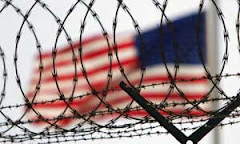The US has long seized and interned combatants whom they categorise as "unprivileged", although the Article 5 (prisoner status) hearings they are entitled to under the Geneva Conventions and US law have never been held.
A few of those who dared oppose US soldiers and military operations overseas are now being brought to the US for civil trials.
Irek Hamidullin is a Russian convert to Islam picked up in the Afghan war and brought to the US for trial in a Virginia federal court on sundry war-related charges – labelled "terrorism" - on the basis that he had been "fighting with the Taliban" – assuming, with George Bush, that Taliban fighters can't be privileged belligerents.
The judge expressed scepticism but allowed the case to proceed. Coverage of the trial has been spotty.
It may indeed be lawful for the US to prosecute military opponents in civil courts using US domestic laws, by classifying them as unprivileged and charging them with terrorism.
As previously noted (see post of Sept 2010) the authoritative Conduct of Hostilities Under the Law of Armed Conflict (2004) provides that:
"With unlawful combatants, [the law of armed conflict] refrains from stigmatizing the acts as criminal. It merely takes off a mantle of immunity from the defendant, who is thereby accessible to penal charges for any offense committed against the domestic legal system."
You'd think that would be the domestic legal system of the country where the war is occurring, e.g. Afghanistan prosecuting personal crimes such as murder and looting committed under cover of war, but according to the ICRC:
"If civilians directly engage in hostilities, they are considered 'unlawful' or 'unprivileged' combatants or belligerents ... [and] ... may be prosecuted under the domestic law of the detaining state for such action."
Knowledgeable academics like Just Security's Steve Vladeck seem comfortable with the idea of US civil prosecutions for foreign battlefield actions, evidently on the assumption that the Taliban don't qualify as lawful, privileged belligerents and are thus "terrorists".
If Hamidullin is meant to be indicative of foreign fighters who have opposed Americans, he seems an odd choice, as he didn't actually harm anyone. As his lawyer pointed out, the case was not about suicide bombings or attacking civilians, and was "the very first case of its kind".
In fact, the US has already obtained a domestic conviction against a foreign combatant for opposing US troops on a battlefield overseas. More here on the conviction of Saddiq Al-Abbadi, achieved through a guilty plea.
The NY Times comments on the strange new trend of prosecuting foreigners in American courts for crimes - if such they be - that occurred outside the US, including many that have little or no connection to the US.
In a British case similar to Hamidullin's, and based on unprivileged combat, a UK resident, Anis Sardar, was convicted of murder for making a roadside bomb that killed a US soldier in Iraq.
What if Sardar had been a lawful combatant? In today's warfare, is the use of a hidden roadside bomb a war crime? Does it involve treachery or an unlawful weapon?
It's being treated as a war crime in the latest Guantánamo prosecution, that of Abd al Hadi. If so, it would be - along with his alleged attacks on civilians - among the first valid war offences charged at Gitmo.
Legal academics are meanwhile debating what to do with the Pentagon's unprivileged belligerents - those CIA operatives, who drone-kill military and non-military targets alike, assisted by mercenaries, sorry, contractors, who could also become unprivileged belligerents, but, like the CIA, receive little oversight.
What could possibly go wrong?
READ THE REST HERE



